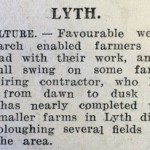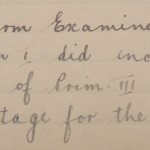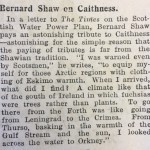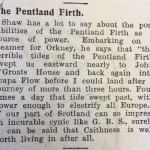The Allied advance into Tunisia continued this week. On 23 March Patton’s II Corps won the first US victory against German tanks at El Guettar, and on the 26th Montgomery’s Eighth Army broke through the Mareth Line, threatening the whole German army which began to retreat north. Also this week the US Navy prevented the Japanese from reinforcing their troops on the Aleutian Islands. And on 24 March 76 Allied prisoners of war escaped from Stalag Luft III in Sagan in the “Great Escape”; tragically all but 3 were later recaptured and 50 of them were executed.
 In Caithness early ploughing and sowing was now well underway. The John O’Groat Journal reported that in Lyth, “Mr Bruce, hiring contractor, who has been working from dawn to dusk with his work tractor, has nearly completed the work on the smaller farms in Lyth district, as well as ploughing several fields on farms outside the area.”
In Caithness early ploughing and sowing was now well underway. The John O’Groat Journal reported that in Lyth, “Mr Bruce, hiring contractor, who has been working from dawn to dusk with his work tractor, has nearly completed the work on the smaller farms in Lyth district, as well as ploughing several fields on farms outside the area.”
Caithness County Council had previously written to commanders of the 51st Highland  Regiment and the Seaforth Highlanders, congratulating them on their recent success at El Alamein. The John O’Groat Journal now printed the reply from Brigadier George Murray, son of Colonel D. Keith Murray, solicitor, of Thurso. “Will you please convey … our sincere thanks for their kind offer of congratulations and good wishes. It is a real source of inspiration to us all to know of the great interest taken by the people of Caithness in their county regiment.”
Regiment and the Seaforth Highlanders, congratulating them on their recent success at El Alamein. The John O’Groat Journal now printed the reply from Brigadier George Murray, son of Colonel D. Keith Murray, solicitor, of Thurso. “Will you please convey … our sincere thanks for their kind offer of congratulations and good wishes. It is a real source of inspiration to us all to know of the great interest taken by the people of Caithness in their county regiment.”
 It was exam time at Dunnet Public School this week, and the Head Teacher was not altogether pleased with the results, writing on 26 March in the school log book, “Second Term Examinations were held this week. Prim. I did encouraging work, but the work of Prim. III was very unsatisfactory.”
It was exam time at Dunnet Public School this week, and the Head Teacher was not altogether pleased with the results, writing on 26 March in the school log book, “Second Term Examinations were held this week. Prim. I did encouraging work, but the work of Prim. III was very unsatisfactory.”
Finally this week, the John O’Groat Journal reported a highly complementary letter by  George Bernard Shaw to the Times after a visit to the north Highlands. “I was warned even by Scotsmen,” Shaw wrote, “to equip myself for those Arctic regions with clothing of Eskimo warmth. When I arrived, what did I find? A climate like the south of Ireland in which fuchsias were trees rather than plants… From Thurso, basking in the warmth of the Gulf Stream and the sun, I looked across the water to Orkney.”
George Bernard Shaw to the Times after a visit to the north Highlands. “I was warned even by Scotsmen,” Shaw wrote, “to equip myself for those Arctic regions with clothing of Eskimo warmth. When I arrived, what did I find? A climate like the south of Ireland in which fuchsias were trees rather than plants… From Thurso, basking in the warmth of the Gulf Stream and the sun, I looked across the water to Orkney.”
Interestingly, Shaw also had some interesting things to say about the possibility of tidal power from the Pentland Firth, describing how the “terrible tides” of the Pentland Firth “swept us eastward to John O’Groats House and back again… Four times a day that tide swept past, with power enough to electrify all Europe.” As the journalist observed, “If our part of Scotland can so impress an incurable cynic like G.B.S., surely it can be said that Caithness is well worth living in after all.”
